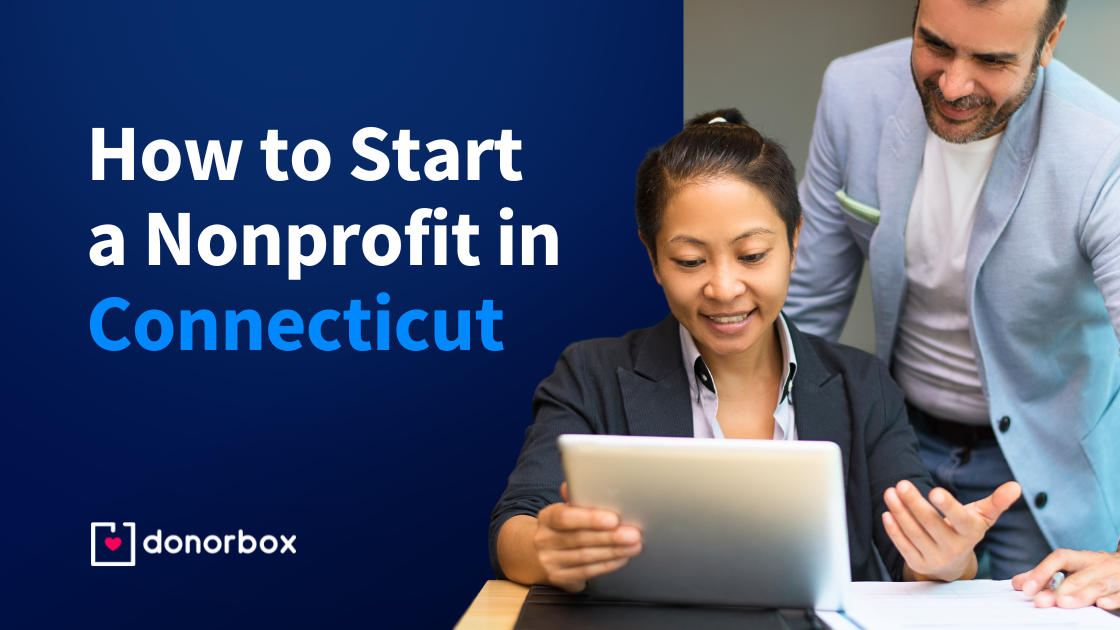There are 22,920 nonprofits in Connecticut. The largest nonprofit organization in the state is Yale University, but thousands of other nonprofits across multiple sectors like medical, social welfare, and more have made it their mission to support the people of the Constitution State.
Starting a nonprofit in Connecticut is a mix of filing legal documents, forming a leadership team, and developing strategic marketing and operational plans. This article will walk you through the process.
Steps to Start a Nonprofit in Connecticut
Forming a nonprofit can be complicated and stressful, but the right tools can eliminate that stress and simplify the process. That is why we’ve created this step-by-step process with tips and resources to use along the way.
Use this Start-a-Nonprofit Checklist to keep track of your progress as you learn how to start a nonprofit in Connecticut!

Step 1: Name Your Organization
The name of a nonprofit should be meaningful to its founders and supporters. It must also be memorable. Connecticut requires nonprofits filing as corporations to include the words corporation, incorporated, company, or abbreviations of these, in the name. Before choosing a name for your organization, you must check to see if it’s available here.
Resource: If you’re struggling to come up with a name for your new nonprofit, use our free Naming & Branding Worksheet!
Step 2: Choose Your Organization’s Mission
Determining your organization’s mission is critical for its success and is an important step in starting a nonprofit in Connecticut (or anywhere!). A mission statement should show who, why, and how you help your beneficiaries. Nonprofit mission statements are the best way to connect and excite donors. Adding a mission statement to your organization’s website, social media platforms, and other marketing materials will educate and inspire donors to learn more.
Pro tip: Check out this guide to help form a mission statement for your new nonprofit.
Step 3: Create a Business Plan
A business plan may seem unnecessary for nonprofit organizations, but it can be an excellent source of information for potential donors and a helpful roadmap for leadership as you start a nonprofit in Connecticut. A business plan for a new nonprofit can be simple but must include the following sections.
Executive Summary
An executive summary is the last thing potential funders will see, but it should be the first thing you write for your nonprofit business plan. This section must include your organization’s mission and purpose, a market analysis for your primary donors, what needs you will meet, and how you will address these needs.
Products, Programs, and Services
The next step lays out how you will meet the community’s needs with programs, products, and services. Provide as many details here as possible and include images and infographics to describe how these programs will help you fulfill your mission.
Marketing Plan
Marketing plans start with market research. Look to your community and at similar nonprofits to learn about your target donors and beneficiaries. What types of events and fundraising campaigns will inspire these donors to give? How can you cultivate relationships with new donors? As you contemplate the answers to these questions, develop a marketing strategy to share with your board of directors and potential funders.
Operational Plan
This next step should be a breeze since you’ve already laid out your organization’s programs, products, and services. A nonprofit’s operational plan must include your primary location, legal requirements, and your nonprofit’s government and organizational structure. You can add an organizational chart here too.
Impact Plan
An impact plan provides additional information on how the organization will fulfill its mission. Include statistics to back up your arguments when possible.
Financial Plan
New nonprofits will have limited financial details, but you can create a list of potential fundraising streams and strategic plans to provide funders when applying for startup funding.
Appendix
Finally, a list of board members and significant staff must be included to build trust and authority. Provide resumes, promotional material, and your organization’s annual strategic plan here.
Step 4: Choose Incorporators and Directors
Nonprofits must have at least one Incorporator when filing with the state of Connecticut. The Incorporator signs the Certificate of Incorporation.
Connecticut also requires nonprofits to have at least three directors. There is no residency or membership requirement, but starting a board of directors is a significant step for your organization. Board members must be educated about their roles within the organization, and it’s best to have an onboarding system for board members to succeed.
In Connecticut, all nonprofit board members are required to serve one-year terms. Organizations must have at least one director to prepare board meeting minutes and authenticate corporation records. The same individual can hold other director roles like President, Vice President, and Treasurer.
The IRS also requires a minimum of three directors, but most nonprofits quickly realize the importance of having a full board. Board members are responsible for governing and overseeing the finances. They are also expected to attend board meetings, hire and oversee crucial staff, form committees, fundraise, and promote the nonprofit to the community.
Pro Tip: Learn more about the key responsibilities of nonprofit board members here.
Step 5: Appoint a Registered Agent
Nonprofits must appoint a Registered Agent to receive legal notices for the organization. This can be an individual or business. Businesses must be located in Connecticut and have regular business hours.
Step 6: File Articles of Incorporation
Now that you’ve laid the foundation, you’re ready to file Connecticut and federal documentation. The first step is to file a Certification of Incorporation with the Secretary of State. A $50 registration fee is required to file online or by mail. Online certifications are processed immediately but expect mailed applications to take three to five days unless you expedite the process for an additional $50.
Before starting the application, it’s best to have the following information ready:
- Business Name and Address
- Business NAICS code
- Business Email Address
- Name of Registered Agent
Make sure you use the same purpose on your Articles of Incorporation that you do when filing with the IRS. This is where your organization’s mission statement can come in handy!

Step 7: File an Initial Report
Within 90 days of filing your Certificate of Incorporation, you must file an initial report for an additional $50 when starting a nonprofit in Connecticut. You can file this online or by mail. You must include the following information:
- Name of Corporation
- Date of First Board Meeting
- NAICS Code
- Primary Office Address
Step 8: Get an Employer Identification Number
New nonprofits must apply using Form SS-4 for an Employer Identification Number (EIN) with the Internal Revenue Service (IRS) before filing for tax-exempt status. This number is also required when hiring staff or contractors and opening a bank account for your nonprofit.
Step 9: Hold Your First Board Meeting
Your nonprofit’s first board meeting is critical for the organization, so you’ll want all board members present if possible. Board members can take this chance to meet each other and better understand their roles within the organization, but legal requirements must also be finalized during this meeting.
During your first board meeting, board members must approve the organization’s bylaws and conflict of interest policy and approve a resolution to open a nonprofit bank account. At this time, you should also nominate and elect board officers and assign board members to committees to ensure the nonprofit’s operations and fundraising can continue immediately.
Bylaws
Your nonprofit’s bylaws are a roadmap for the leadership to follow. Nonprofit bylaws should include:
- Name and purpose of the organization
- Officer roles, terms, and election details
- Board meeting guidelines, including frequency and quorum
- Board structure, including size and committees
- Membership program details
- Compensation and identification of board members
Conflict of Interest Policy
Nonprofit board members must also vote on and approve a conflict of interest policy during the first board meeting. This document covers how your organization will respond when someone in a leadership position has competing interests.
Step 9: Apply for 501(c) Status
The IRS rewards federal tax-exemption for organizations with the following purposes:
- Charitable
- Religious
- Educational
- Scientific
- Literary
- Testing for public safety
- Fostering national or international amateur sports competitions
- Preventing cruelty to children or animals
Churches do not have to file for tax exemption with the IRS, but many do so to increase their authority and trustworthiness.
Nonprofits that earn under $50,000 for the first three years can file Form 1023-EZ for $275. There is an eligibility worksheet to determine if your organization qualifies. All other nonprofits must file Form 1023 and pay $600. It can take up to six months to receive your determination letter from the IRS.
Step 10: Apply for State Tax Exemption
Nonprofits with a determination letter from the IRS can file for sales and use tax exemption in Connecticut. The Department of Revenue Services accepts a determination letter or a Connecticut Exemption Permit (E-Number Permit) issued before 1995. Nonprofits must complete CERT-119 and provide this form and their determination letter to sellers.
Organizations that provide food and lodging to event attendees without reimbursements must file CERT-112 for tax-exemptions on these items. You must attach your determination letter with this form.
Nonprofits that sell goods or services must obtain a Connecticut Sales and Use Tax Permit and collect taxes on those sales.
Step 11: Register for Charitable Solicitation
Connecticut nonprofits are required to register with the Department of Consumer Protection before soliciting donations within the state. There is a $50 registration fee. Applicants for full charity registration must submit a financial report for the most recent fiscal year (if completed), board and staff details, and your organization’s purpose. Nonprofits must continue registering with the state at the end of every fiscal year with an audited financial statement for $50. There is a $25 late fee.
The following organizations are exempt from registering as a charitable solicitation:
- Religious organizations
- Educational institutions
- Parent-teacher associations
- Nonprofit hospitals
- Government organizations
- Charities that collect less than $50,000 annually
- Fundraisers that solicit for exempt organizations
Step 12: Business Licenses and Permits
The state of Connecticut does not require nonprofits to register for permits to hold a raffle. If you plan on running a raffle during an upcoming fundraising event, be sure to check with your local municipality for registration requirements.
Step 13: Annual Report
All corporations, limited liability companies, and partnerships must file an annual report in the state of Connecticut. You should receive an email from the Secretary of State’s office one month before your annual report due date. Filing an Annual Report costs $150 for corporations and $80 for Limited Liability Corporations (LLCs).
Legal requirements are not the only reason for nonprofits to share their annual report with the public. Donors are picky about which nonprofits they choose to support. Adding an annual report to your website and third-party sites will help your nonprofit build trust with donors and can be an exceptional marketing and fundraising tool.
Pro Tip: Visit our website for tips on how to create a compelling annual report.
Conclusion
Starting a nonprofit in Connecticut is more than just a bureaucratic process. It’s a chance to impact countless lives and communities across the state. You can confidently navigate this process by following the steps outlined in this guide.
Donorbox prides itself on supplying weekly articles and resources to help manage and fundraise for your new nonprofit.
When you’re ready to get started, check out this list of affordable features for an idea of how we can help you fulfill your mission through a suite of innovative fundraising tools.






